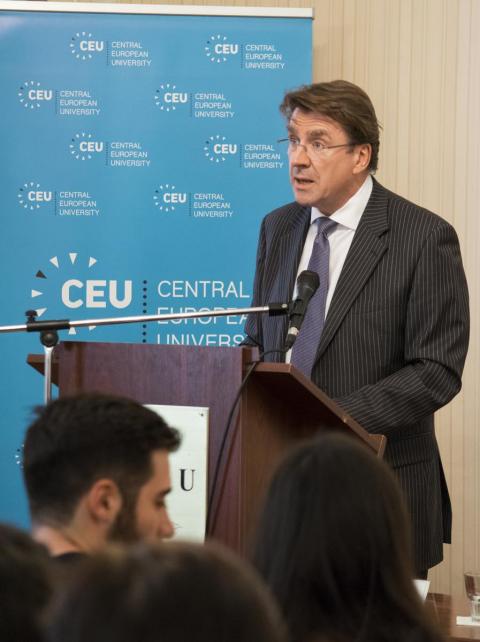Event report - "Britain’s Role in the Future of Europe"

The CEU Center for European Neighborhood Studies (CENS) and the CEU Rectorate hosted a public lecture on 24 October 2016 entitled “Britain’s Role in the Future of Europe”. The lecture was delivered by H.E. Iain Lindsay OBE, Her Majesty’s Ambassador to Hungary to a distinguished group of students, diplomats and university professors.
In his opening remarks Ambassador Lindsay referred to the fact that over 33 million people took part in the recent British Referendum – a major exercise in democracy – and the majority decided to leave the European Union. Many people in Britain and elsewhere in the EU are keen to see rapid progress and to understand what the UK’s relationship with the EU will look like after Brexit. “At this stage, we simply don’t know”, Ambassador Lindsay said. The British Government is currently getting ready for EU exit negotiations, which have to be ambitious and bold, and the UK is determined to make a success of Brexit.
The Ambassador reminded that this will be a complex process that will require time, expertise and a consistent approach, which is why a dedicated Department for Exiting the EU has been created within the British Government. Following the formal announcement of leaving the EU, Britain will negotiate the manner of its departure from the Union and start to construct a new relationship with its EU neighbours. This will be a fundamental change for the country and in its relationship with the EU, but “our outward-looking view of the world will remain”, emphasized the Ambassador.
As the British Government has made it clear, it is not about the Norway model or the Swiss model, or any other country’s model - this is a good occasion for Britain to develop her own British model, seizing the opportunities that Brexit presents. Britain is a great trading nation and now has the chance to explore new bilateral trading arrangements with key partners around the world. Britain will seek to become a global leader in free trade as it leaves the EU.
The Ambassador outlined that when the British people decided to leave the EU, they did not choose to leave Europe, to turn inwards or to walk away from the G7, the G20, NATO or any of their international partners. Britain remains a major player in international organizations; a permanent member of the UN Security Council, the second largest contributor to NATO, a member of the G7, the G20 and the Commonwealth. Britain is open for business and remains committed to peace and security, taking part in countering Daesh and supporting nations such as Afghanistan in their fight against terrorism.
Speaking in terms of economy, Britain had the second fastest growing major economy in the world last year. The UK has the highest employment rate in history, low and stable inflation and many investment possibilities. In short, the UK remains a great place to do business. London is regarded as the world’s leading financial hub with the largest market share in the world for financial services.
If we look at the top 10 markets with which the UK has a trade deficit, 7 out of 10 are in the EU. It is, therefore, very much in the interests of other EU states that Britain and the EU make a success of Brexit and this new relationship.
Besides business, Britain’s leading role in areas such as popular culture, education and the provision of skilled workforce will remain unaffected by the decision to leave the EU.
Ambassador Lindsay finished by saying that Britain wants a win-win outcome. ‘Britain is leaving the EU, but not leaving Europe”, he concluded, further emphasizing the importance of a strengthened UK-Hungarian bilateral relationship.
The lecture was chaired by Péter Balázs, Director of CENS and former Hungarian Minister of Foreign Affairs and was followed by a lively questions and answers session.
